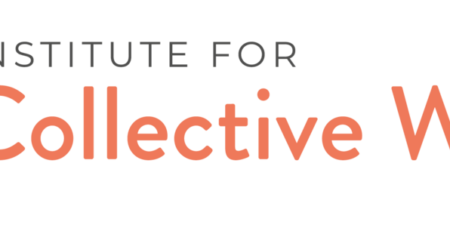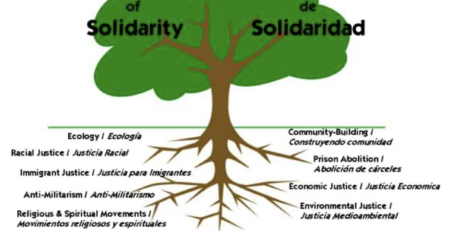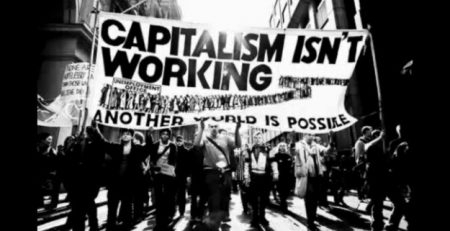via The Next System
Emily Kawano, coordinator of the US Solidarity Network, Intercontinental Network for the Promotion of the Social Solidarity Economy (RIPESS), and co-director of the Wellspring Cooperative in Springfield, Massachusettes, joins us to discuss her work on the Solidarity Economy.
Adam Simpson: You’re listening to the Next System Podcast. Our guest is Emily Kawano, a coordinator at the US Solidarity Economy Network, a board member of the Intercontinental Network for the Promotion of the Social Solidarity Economy (RIPESS). She is also the Co-Director of the Wellspring Cooperative Corporation in Springfield, Massachusetts. Emily, welcome to the Next System podcast.
Emily Kawano: Thank you. Happy to be here.
Adam Simpson: So first, I feel like we should explain this term to our audience, the “solidarity economy.” What does the solidarity economy mean to you and what does it mean to the people that you work within these networks?
Emily Kawano: So solidarity economy is a relatively recent term. It is a number of things. It is a global movement to build an economy that works for people and planet and it is an alternative to capitalism. It is also a set or practices that align with solidarity economy principles and we can get back to that in a moment. It’s also a framework or a theory that articulates a particular approach to how the economy should work and again, it’s really all about an economy and a world that works for people and planet, as opposed to private profits and blind growth.
Adam Simpson: Right. And how did you first come to learn about the solidarity economy? What drew you to this work?
Emily Kawano: So I’m an economist by training, and I have been involved for many years in popular economics. I’m a long time member and was Executive Director for the Center for Popular Economics, which is a collective of progressive economists. Our mission was to help folks, particularly grassroots activists, better understand how the economy works, so that they can be more effective in their organizing. And I think we did a bang up job in critiquing capitalism, but we did a less good job at articulating and helping people grapple with and envision what the alternative is. We always [tried to do] that, but we were never quite satisfied. And so we were really looking for a way to help people grapple with this issue and do visioning in a coherent way. That eventually led us to this framework of solidarity economy, which was really sort of taking off as a movement in different parts of the world and just beginning to take off and put down roots in the United States. The nice thing about solidarity economy, it’s not a blueprint, it’s not an “-ism.” You don’t have to sign up to be a this brand of socialist or this brand of whatever. You don’t have to pledge yourself to an “-ism.” It’s a very big tent, but it’s very much grounded in principles and brings together many practices that make sense in trying to build a more just and equitable and sustainable world.
So this was really a search for a good way to engage folks. In 2007, we organized a meeting at the first US Social Forum of people who were working in that space, in the solidarity economy space, and out of that emerged the US Solidarity Economy Network. And from the get-go we’ve been connected to RIPESS, the Intercontinental Solidarity Economy Network. What started in 2007 was really the first network in the US, and it’s grown from there.
Adam Simpson: Some of the principles of the solidarity economy, you alluded to them and I want to investigate them now. I’ve seen these principles you expressed as 1) solidarity and cooperation, 2) equity, 3) participatory democracy, 4) sustainability and 5) pluralism. And I know I’m running through those perhaps more quickly than they deserve, but how does our current system of capitalism and free markets fail to uphold these values that are centered in the solidarity economy framework?
Emily Kawano: That’s a great question. So how does our current economic system dominated by capitalism clash with those principles? From the get-go if you think about solidarity, capitalism really, by definition, is about competition. It’s not about solidarity and cooperation, it’s really about competition. If you think about the principle of equity (in terms of race, class, gender, et cetera) from the very get-go again, if you think about a system that’s really grounded in celebrating competition, it’s not about equity, it’s not about fairness. It’s about survival of the fittest, it’s about social Darwinism. So it’s not very good at upholding equity. Our system really ignores history, so it ignores questions like: how did some people get a leg up? how did some corporations get a leg up? where did that wealth come from in the beginning to start building that empire or that dynasty or that corporation? This is the question of what’s called “primitive accumulation”: you have to think about colonialism, you have to think about conquest, you have to think about genocide, you have to think about slavery, you have to think about expropriation of land. Right?
Our current system completely ignores all that history, which is where a lot of the original wealth came from in which capitalism is really grounded. And then to bring it up to the everyday practices that are alive in our economic system, practices such as racism and patriarchy are used every day to divide and conquer. So when working people try to unite, racism is used, patriarchy is used, to favor one group over another and deepen these divides. So from the get-go, capitalism not only takes advantage of and exacerbates inequities, but is really grounded in exploitation and extraction and isn’t committed to trying to reverse those injustices. In terms of things like participatory democracy, by definition capitalist enterprises have a boss, they have an owner and they have workers, right? And so this is inherently at odds with true participation—because even if you have a benevolent owner or boss, legally they can always withdraw whatever participation there is.
We talk a lot about collective ownership in control and management as something opposed to this class system with owners and workers—which isn’t to say that there aren’t socially responsible capitalist businesses. It’s not to throw stones, but it is to say as a system there’s a class divide, there’s owners and there’s workers and that’s problematic for a solidarity economy.
In terms of sustainability, the search for profits trumps a concern for the environment. We see that all the time in the argument that we shouldn’t participate in this agreement or that agreement because it’s going to damage profits. Again, there are individual capitalist enterprises that do care about ecology, that do care about climate change—they’re trying to do their best. But as a system, if you look at the dominant system—and particularly in the United States—there just isn’t that commitment because there’s always this competitive pressure to maximize profits.
So, yeah. Capitalism is almost inherently at odds with principles of solidarity economy.
Adam Simpson: I want to turn this from principles toward solidarity economy in action. What are solidarity economy networks that you’d point to for people that were interested in learning more about and hopefully getting involved in such efforts?
Emily Kawano: So solidarity economy is more well developed in a lot of other parts of the world than the United States. Just to name a few, there are in some countries, such as Brazil, Portugal, and Spain, solidarity economy ministries. It’s embedded in government, which is interesting. There are even more countries that have national framework legislation in support of solidarity economy, which basically says that the government should try to support solidarity economy initiatives. Whether it’s trade, whether it’s some kinds of subsidies or tax breaks, the bias should be that the government tries to support the development of solidarity economy. There are examples. For instance, Brazil is one of the most advanced in promoting solidarity economy, although with their recent political struggles, that’s been somewhat undermined. But nonetheless, it was one of the first countries to have a solidarity economy ministry. They have a civil society counterpart, the Brazilian Solidarity Economy Forum, which has local forums in pretty much all of their states.
It’s a very vibrant civil society network. They’ve mapped the solidarity economy—they’re really focused on building solidarity economy supply chains. One example is Justa Trama, which produces clothing. A t-shirt that they produce: they’re sourcing their cloth from a cooperative fabric maker, which in turn is sourcing the dyes and the thread from social economy or solidarity economy enterprises, et cetera. Right? All the way down the line. That’s ultimately the idea: trying to build the solidarity economy chains. And also when we’re looking for financing, we’re going for loans from cooperative banks or credit unions, and when we’re looking for marketing, we’re going to cooperative markets. So that’s the idea of building solidarity economy chains: that we’re building our economy in directions that aligns with our values.
I would say in the United States, the examples of solidarity economy, a lot of it is sectoral. Obviously cooperatives are a real backbone of the solidarity economy, whether we’re talking about worker cooperatives or producer cooperatives or consumer cooperatives and trying to connect all these things up. The cooperative sector is experiencing a real boost. There’s a lot of interest, a lot of cities are investing millions of dollars and supporting particularly worker cooperatives as a strategy for inclusive economic development.
But beyond that right, we’re not only talking about cooperatives. We’re talking about things like participatory budgeting where people have input into at least a portion of say a city’s budget. Right? So, that’s spreading in the United States. Models like community land trusts are spreading. Models like community supported agriculture, where people commit to buy produce from or actually are some kind shareholders in a farm, in order to support their local farmers. We support things like social currencies, local or otherwise. Solidarity economy also embraces unwaged or non-monetized economical alternatives that are invisible, but that we should recognize as important economic activities, such as care work. Everybody’s involved in that, whether you’re raising your children or you’re taking care of your elderly parents or you’re taking care of your neighbors. This is all valuable economic activity, so embrace that!
Part of what we’re saying is that there’s this huge foundation that already exists of economic activity that’s driven by care, that’s driven by love, that’s driven by reciprocity, and it’s driven frankly, because it’s a way that people survive. This includes things like all kinds of DIY activity. There’s this huge foundation, we don’t have to invent solidarity economy from nothing. There’s a huge foundation to build on, but right now all those activities are sundered from each other.
They’re separated from each other and part of what solidarity economy is trying to do, is saying if we can connect these things and lift it up as a kind of coherent system, there’s quite a significant foundation.
Adam Simpson: With regard to care work, how do you feel about bridging the competing interests between the notion that this is work that we probably don’t want to commodify in the sense of a broader capitalist framework, but that we also don’t want to be unpaid and inherently exploitative, often along gender lines and race lines and class lines. Do you have a sense of how you would approach that dilemma within a solidarity economy framework?
Emily Kawano: Yeah, that’s a great question. So some of it is about first of all recognizing unpaid care work as just being valuable and a legitimate economic activity, as opposed to something that particularly women are supposed to just deliver for free because they love their children. Then along with that is including care work in economic measurements, which is starting to be done. To measure and collect data on how much time is spent on care work… Once you have a sense of how much that is worth, if you were to say in terms of hours, how much time is going into that and saying this is legitimate, valuable work, then that drives other things. It drives policy on flex time, it drives policy on child care, it drives policy on personal time. It legitimizes people needing to take time off to do that kind of very valuable work. It also can drive policy in terms of helping to lighten the load.
So maternity, paternity leave are really, really critical—like they have in other countries. And this is really beginning to change, I think. A lot of other countries are much further along than we are. Recognizing, measuring, valuing: then the policies can change.
In the very long term, one thing that I think we need to grapple with is thinking about the future of work or the future of jobs. With automation, with AI, already there are not enough jobs, certainly in the United States, certainly globally, there are not enough good jobs. And that’s only going to get worse over time, I know there’s some debate about this, but I think that we really need to be talking seriously about what’s it going to look like as we project into the future. According to some projections, by 2030 40% of jobs could be eliminated by automation and artificial intelligence. Even if it’s half that, that’s going to be devastating.
And I do think we need to really start thinking about what does the world look like if we’re not talking about jobs, jobs, jobs. What are other ways to support livelihoods, rather than a 40 hour a week job? Shorter work weeks, I think we need to start thinking about sharing the wealth. There’s plenty of wealth but it’s just being concentrated in a few hands. So I think we need to start talking about universal basic income. It’s wealth that we’ve all created and it’s just being funneled into too few hands and so we need to think about redistribution. And I think that discussion about a universal basic income is really beginning to gather momentum and more support. I think we need to think about that.
I’m really intrigued by the notion of community production. Especially if we really leverage the technology that’s emerging. like 3D printing and other stuff that I don’t even understand. There’s a lot of potential for us to locally be creating, not only growing our own food but also printing our own cars and printing our own houses—it’s amazing what we’re on the cusp of.
Adam Simpson: Absolutely.
Emily Kawano: So I think we need to be thinking creatively about what it mean as jobs are disappearing. What does it mean to create livelihoods that are meaningful that leverage our local communities and our relationships? We don’t have all the answers, but there are interesting examples and experiments going on that we need to pay attention to.
Adam Simpson: Well let me ask you about one experiment in particular, the Wellspring Cooperative. I know that you’ve been intimately involved in the work of the Wellspring Cooperative and I wanted you to tell us a little bit more about this network, what it looks like today and what you’ve learned with your experience with Wellspring?
Emily Kawano: Wellspring Cooperative is a non-profit working in Springfield, Massachusetts. Springfield is the third largest city in Massachusetts. It’s a medium sized city that’s gone through the typical deindustrialization process. It’s lost its manufacturing base and it’s definitely a hurting city—high unemployment, high poverty, facing all those kind of problems. Wellspring Cooperative is working to build a network of worker owned cooperatives in Springfield’s underserved communities. So it’s about job creation, it’s about wealth building, so that the worker-owners are able to build their wealth, they’re able to build their assets as the businesses grow and prosper. We have three businesses in our network right now. One is an upholstery cooperative, one is a women-owned window restoration cooperative, and the third one, we’re just finishing construction on a hydroponic greenhouse. It’s a quarter acre hydroponic greenhouse and we will be planting within a couple weeks.
Adam Simpson: Excellent.
Emily Kawano: Yeah, that’s just launching. The fourth one that’s just emerging is a catering business that would provide multi-ethnic cuisine. And the hope is to eventually have a network of a hundred businesses. Employing thousands of people to really shift the economic base in Springfield. We have three strategies for cooperative development. We started off really leveraging the anchor institution model, which as you know, the Democracy Collaborative has been really involved in, with the Evergreen Cooperatives. We certainly built on that and we’re very appreciative of the support that we got from the Democracy Collaborative. Ted Howard was very, very generous with his time. It was critical to our development that we were able to bring a group of people from Springfield out to Cleveland, that was really a game changer. I mean people went from, “Oh, this is a nice idea,” to thinking, “Oh, this is possible.”
So we definitely built on that anchor institution model of leveraging the joint purchasing power of the big institutions that are anchored in place like the colleges and hospitals. But we have also added to that anchor institution model of more bottom up approach. We have developed an educational program, a co-op certificate program in partnership with a community college. We piloted it in September, we’re running the full 14-week course this spring and so that’s for people who are interested in starting up their own. So it doesn’t necessarily meet anchor institution needs but it’s people that have an idea and they’re interested in starting up their own co-op.
And the third model that we are interested in is conversions, which is quite hot these days. The idea is to take a conventional firm and convert it into a cooperative, often it might be an owner who is aging out and is interested in selling out to their workers and it becoming a cooperative.
Adam Simpson: I want to back up to just a second when you were talking about in Springfield with the Wellspring Cooperative, “we want a hundred businesses.” So this is the Next System Podcast, which always involves a bit of hypotheticals and a bit of looking forward. But I want to ask like if you were able to achieve this—a hundred interconnected, interdependent cooperative enterprises and businesses in your community—what would your relationship be with the broader kind of traditional private enterprises in the area? What would your relationship be to the local government and the community? I’m just trying to really imagine what that would look like within our current system.
Emily Kawano: That’s an interesting question. You know I think the thing is cooperatives can work completely comfortably with conventional businesses. So within the capitalist system there are lots of cooperatives that exist and there’s no friction whatsoever. And it’s a different way of doing business, so you can certainly think of it like that. Wellspring certainly is about something a little broader. Pushing the idea that cooperatives aren’t just a different way of doing business, they are an alternative to the mainstream way of doing business, one that promotes economic democracy, that promotes local control and ownership. And this is a different model and if we can prove that it works and we can prove also that it is a part of a strategy for more inclusive economic development so that we’re really talking about creating businesses in some of the hard hit communities in Springfield.
That’s valuable. It’s possible the more open, the more vocal we are about, “oh, this is kind of an alternative!” it might raise some friction, but right now our experience is that people who are not familiar with cooperatives are perfectly supportive and enthusiastic about this. Partly because Springfield has been so challenged, has had such persistent problems, that if there’s another way of doing things and developing jobs, people are open. And I think it’s possible that we’re in a time, we’re in a period, really still coming out of the crisis, the meltdown of 2008. There are a lot of people who still feel like their confidence in our current dominant system was shaken to the core, and the question is: can we do better? Are there ways of doing business and constructing an economy that are more just and sustainable? I think that there’s an interest in doing that. So, that’s really what it’s about. We would love it if there was more support. We’re trying to build that support politically with the local government, with the state government and with businesses and the institutions. There hasn’t been friction, there hasn’t been hostility, and I think we’re on the same page in terms of trying to build a more just and sustainable economy and thriving communities. Everybody wants that.
Adam Simpson: I was going to ask earlier, some of this reminds me in a way of the notion of an intentional community. But I think when people think of an intentional community, they think far away in rural America and it’s often associated with the negative conceptions Americans have about communes or what have you. But this seems similar in that sense like an intentional supply chain that’s being created, like there’s intention being added where… there’s already a community but the intention is coming afterward. Is that right?
Emily Kawano: “There’s already a community.” say what you mean by that?
Adam Simpson: When I think about an intentional community, you would go out into a rural area, you would buy a plot of land, and you and the people that believe in the same idea would do this project there. But it would be in some sense disconnected from the broader system. Whereas the solidarity economy, there’s a community and we’re kind of coming to it with a certain set of principles and intentions, and rather than removing yourself. You’re kind of building within, if that makes sense. You’re intentionally creating the supply chain that you want to see.
Emily Kawano: Well that is absolutely true. That it is certainly an approach of building from within. Absolutely. And trying to leverage whatever potential we can. So starting with things that exist and simply trying to build, to some extent, the relationships and to build the connections. And not every individual person, not every individual business is going to be onboard with this. When we go to a worker cooperative or a cooperative federation and talk about solidarity economy, not everybody is onboard with that. And we say, “We really see worker cooperatives as being a core piece of solidarity economy.” Some people like that and they’re onboard with it and then they’re excited about being part of a larger project. Some people aren’t. Or credit unions, we embrace credit unions, they’re a form of a cooperative. Some credit unions are totally happy with a capitalist system. They think capitalism is great and we don’t want to particularly pick a fight. But some credit unions might think, “Yes. I want to be onboard with this vision of building an economic system that really has different principles and different aims.”
We are looking to bring people along so that we recognize each other as part of the same project and not to isolate ourselves. Exactly not to say, “Oh, we’re going to build our alternative off in the mountains or whatever.” For sure, we also embrace a lot of the intentional communities that do exist, that are doing exactly that. And so it’s very big tent, there are a lot different approaches. And there are valuable learnings that come from some of those intentional communities are very isolated. They’re doing some very interesting things. But we absolutely are committed to looking at what exists across the board, trying to raise the level of awareness, trying to get us to recognize each other as being co-builders of this alternative economy and that we’re all engaged in trying to build this better world. So in that sense yeah, there’s a community that exists, but right now we don’t necessarily recognize each other. And that’s part of what solidarity economy is about.
Adam Simpson: Well that brings us kind of to some questions I have about kind of the theory of change with regard to solidarity economy. So tell me if I get this right, but as I understand it the solidarity economy is in some sense kind of both the means and the ends when it comes to system change. Is that correct?
Emily Kawano: Absolutely. We’re building as we ago. We don’t believe that we’re building, building, building, and some day we’ll have the end of history and we’ve accomplished it. We’re learning as we go. Anybody can practice solidarity economy every day. As I said, whether you’re raising children or you’re doing volunteer work or you’re taking care of your elders, you’re engaged in solidarity economy. Solidarity economy is a way of being. It’s a way of relating to each other. It’s really celebrating a different focus on the economic actor. So I’m an economist by training and in mainstream economic theory, the central character is homo economicus.
Rational economic man is self interested, calculating, always trying to get the biggest bang for the buck. Homo economicus, from which we build up economic theory of capitalism, is completely without a heart. We don’t think about love, we don’t think about relationships, we don’t think about caring, we don’t think about reciprocity. So I think that an economy built on only part of human nature is inherently flawed. Solidarity economy would put a different character at the center of the economy. Solidarity economy would maybe center homo solidarius. We have to recognize that we all have self-interests, that we all are rational, that we all do some calculation, but we also love and we connect and we have relationships and this is a lot of what drives us.
We need to build an economy like that. And so one of the ways that we practice solidarity economy every single day is just in our relationships, being kinder to each other, being compassionate to each other, acting in solidarity with each other.
It’s a different sort of economic activity but it’s also a different way of celebrating the way we interact with each other. So solidarity economy is more than an economy. We understand that we need to think about transformation of not only the economy, but the economy very broadly conceived, which is our culture, our society, our political system or our world.
Adam Simpson: Well just given this theory of change, it seems like the solidarity economy model should give a lot of people kind of hope and giving them action in this current context of the Trump administration. We’ve heard a lot about the notion of resistance but for the solidarity economy framework, I’ve seen you emphasize the notion of “Resist and build” in this context. What do you think the possible contribution of the solidarity economy model could be given our political circumstance?
Emily Kawano: I think that the progressive movement, the Left movement has been much stronger in the resist than in the build. I’ll give you an example, last year I went to the Women’s March in Boston, it was big, it was impressive, it was inspiring. But there was no mention of anything concrete, right, in terms of building something new. What are we specifically talking about when we’re talking about a more just and sustainable economy? It’s always, “what are we against? What are we against? What are we against?” And then it’s reforming those things that we’re against. I think we need to know what we’re against and articulate that. ‘Resist’ is super important. But we also need to be clear about what we’re for and there’s not one answer, but we need to be emphasizing that: to know what we’re against but also be able to articulate what we’re for.
So in my many years working with the Center for Popular Economics, and working with grassroots activists who are engaged more in resistance, it sometimes feels like you’re banging your head against the wall, because you’re trying to get something, often from someone very powerful, either corporations or government. And you can work for years and years and years and years and maybe there’s a step forward and then there’s two steps back. It’s a long hard process. Total credit to people that are engaged in that, but it’s hard. And ‘to build’ is something you can get started on, communities or groups of people can get started on, without necessarily asking other people. They’re not necessarily asking the government to do something or to intervene or to pass a policy. They can go ahead and organize their own time bank or they can organize their own swap meet or maybe they can start up their own worker cooperative or they can start up group purchasing. So there are many things that people can do from small things to more ambitious things and people can get on with it. And so that can be really helpful in the movement.
Adam Simpson: Well that brings us to what I detect is a tension—maybe I’m wrong—in the solidarity economy space, because there seems to be, on the one hand… These kinds of projects, you don’t need permission from a government. And I understand that there are a lot of people that come from a more autonomist perspective that, it’s not that they don’t seek permission from the state to do these cooperative projects, to build these networks, but they kind of reject the notion of kind of that type of political and state engagement. Whereas in a place like Jackson, very much connected to Cooperation Jackson was the campaign for mayor of Chokwe Lumumba. And I just wanted to ask your own perspective on this kind of tension if you will?
Emily Kawano: You know the really nice thing about solidarity economy and what I have found to be so liberating is it is pluralist. There is not just one strategy, it’s not a one size fits all blueprint. There are experiments. The autonomista movement in Chiapas, they’re experimenting with not engaging with the state. And trying to build their own social and economic system and so we celebrate that diversity and different experiments. And I don’t know that I would characterize it as a tension. It might eventually come to a tension. So there might be people in Cooperation Jackson that are going to say, “We shouldn’t engage in local electoral politics.” That doesn’t seem to be the way they’re going, but you know for the moment in the United States, I would say most people working in solidarity economy or who use this framework recognize that the state is here, it’s powerful. It has a tremendous presence and we need to deal with it. I think in general, solidarity economy certainly in the United States, in terms of our engagement with the state and electoral politics and even policy, we’re much more at an early stage than other countries that are much more engaged with the government.
Certainly on the national level, on the federal level, boy, I don’t see a lot of ground for progress there. I mean there’s so much deadlock there. On a local level I think there’s a lot of potential and so there are experiments. There are solidarity economy initiatives popping up here and there, and articulating this and trying to gain traction with local government.
So yeah, different things are going to work in different places and rather than necessarily throwing stones at each other, which has been sort of something that the Left has engaged in a lot, let’s say rather there’s so much work to be done.
There’s so much work to be done. Let’s see what works. Yeah.
Adam Simpson: Thank you Emily and we’ll see everyone next week on the Next System podcast.
Subscribe to the Next System Podcast via iTunes, Soundcloud, Google Play, Stitcher Radio, or RSS.












Leave a Reply